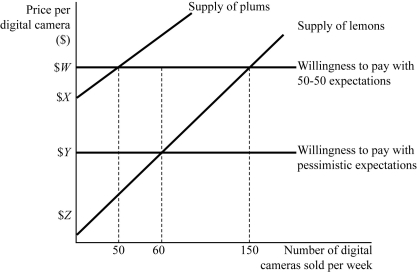Exam 9: Imperfect Information, External Benefits, and External Costs
Exam 1: Introduction: What Is Economics118 Questions
Exam 2: The Key Principles of Economics144 Questions
Exam 3: Demand, Supply, and Market Equilibrium172 Questions
Exam 4: Elasticity: A Measure of Responsiveness267 Questions
Exam 5: Production Technology and Cost211 Questions
Exam 6: Perfect Competition218 Questions
Exam 7: Monopoly and Price Discrimination144 Questions
Exam 8: Market Entry, Monopolistic Competition, and Oligopoly464 Questions
Exam 9: Imperfect Information, External Benefits, and External Costs416 Questions
Exam 10: The Labor Market and the Distribution of Income241 Questions
Exam 11: Measuring a Nations Production and Income152 Questions
Exam 12: Unemployment and Inflation155 Questions
Exam 13: Why Do Economies Grow144 Questions
Exam 14: Aggregate Demand and Aggregate Supply160 Questions
Exam 15: Fiscal Policy133 Questions
Exam 16: Money and the Banking System150 Questions
Exam 17: Monetary Policy and Inflation141 Questions
Exam 18: International Trade and Finance210 Questions
Select questions type
Suppose Smith's oil refinery and Jones' paper mill both pollute a river and both firms operate under a system of marketable pollution permits. If it costs Smith $45 to reduce pollution by 500 gallons per day, and Jones can reduce costs by $65 by increasing pollution by 500 units per day
(Multiple Choice)
4.7/5  (41)
(41)
If eight lemons (low quality) and two plums (high quality) are supplied and buyers assume that there is a 40% chance of getting a lemon, there is an equilibrium.
(True/False)
5.0/5  (33)
(33)
In which of the following situations should a firm reduce its efforts to abate pollution?
(Multiple Choice)
4.9/5  (36)
(36)
The tendency for people who have good health insurance to take more risks with their health is called adverse selection.
(True/False)
4.8/5  (40)
(40)
You do not worry about how your bank is investing your money because your deposits are federally insured. This is an example of
(Multiple Choice)
4.8/5  (39)
(39)
People who buy used homes often insist on having a "home inspection" before they finalize the purchase. If the house fails the inspection the buyer has the right to refuse to buy the house unless the seller fixes whatever problems are found. Does this help or hurt the seller?
(Essay)
4.7/5  (35)
(35)
 Table 9.3
-Table 9.3 represents 3 markets for used stereos. Which of the markets in Table 9.3 are NOT in equilibrium?
Table 9.3
-Table 9.3 represents 3 markets for used stereos. Which of the markets in Table 9.3 are NOT in equilibrium?
(Multiple Choice)
4.9/5  (38)
(38)
 Table 9.2
-In Table 9.2, Market 2 would be in equilibrium if buyers believed lemons account for
Table 9.2
-In Table 9.2, Market 2 would be in equilibrium if buyers believed lemons account for
(Multiple Choice)
4.7/5  (41)
(41)
Suppose Jones' company and Smith's company both pollute. Under a system of marketable pollution permits, which of the following must be TRUE in order for Smith and Jones to benefit from trading the right to pollute?
(Multiple Choice)
4.9/5  (31)
(31)
Recall the Application about how having car insurance affects driving behavior to answer the following
question(s).
-Recall the Application. A study of the effect of automobile insurance and traffic fatalities conducted by Alma Cohen and Rajeev Dehejia estimates that a one percentage point decrease in the number of uninsured drivers
(Multiple Choice)
4.9/5  (37)
(37)
Marketable pollution permits increase the amount of pollution generated because firms that don't want to reduce pollution can buy the right to pollute.
(True/False)
5.0/5  (44)
(44)
If you can consume a good at the same time that others consume the same good, the good is nonrival in consumption.
(True/False)
4.9/5  (40)
(40)
Recall the Application about genetic discrimination to answer the following question(s).
-According to the Application, the information provided from genetic testing would ________ insurance prices for high-cost customers, ________ insurance prices for low-cost customers, and therefore ________ the adverse selection problem.
(Multiple Choice)
4.8/5  (35)
(35)
 Figure 9.4
-Figure 9.4 represents the market for used 12 megapixel digital cameras. Suppose buyers are willing to pay $400 for a plum (high-quality) used digital camera and $200 for a lemon (low-quality) used digital camera. If buyers believe that 50% of used digital cameras in the market are lemons (low quality), how many lemons will be supplied by sellers?
Figure 9.4
-Figure 9.4 represents the market for used 12 megapixel digital cameras. Suppose buyers are willing to pay $400 for a plum (high-quality) used digital camera and $200 for a lemon (low-quality) used digital camera. If buyers believe that 50% of used digital cameras in the market are lemons (low quality), how many lemons will be supplied by sellers?
(Multiple Choice)
4.7/5  (45)
(45)
Showing 61 - 80 of 416
Filters
- Essay(0)
- Multiple Choice(0)
- Short Answer(0)
- True False(0)
- Matching(0)